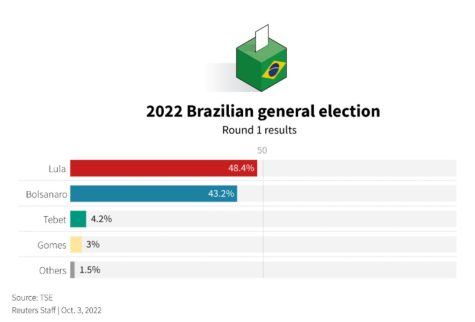Adviser’s Note: The views, thoughts, and opinions expressed in this opinion article belong solely to the author and do not reflect the view of The Colt Chronicle Staff, Kinnelon High School, or its students and staff members.
After an intense, polarized election featuring a runoff and threats of a coup, Lula Da Silva has taken office as Brazil’s new president. The election was fraught with mud-slinging and claims of fraud, chiefly from incumbent president Bolsonaro. His opponent Lula had previously been convicted in a corruption scandal during his first time in office a few years ago, which Bolsonaro used to spark a major divide over the issue of his innocence.
To make matters worse, the incumbent president claimed that he would refuse to accept a loss in the election, using rhetoric that carried an eerie resemblance to that of former US President Donald Trump. After a tense wait to see how Bolsonaro would respond to his defeat, most people have begun to accept Lula as the new president. Many others took to the streets and began to protest.
The extent of the divide in this particular election was so severe, in fact, that a runoff was necessary to get the results as in Round 1 neither candidate obtained 50% of the vote. Visualized in the image on the left, the race was very close, which only worsens the debate concerning the legitimacy of the election. The current problem facing the country: the election was fair, and yet only a fraction of the nation’s residents feel confident about its legitimacy.

The way this issue arose was no accident. In fact, it was the culmination of a months-long propaganda campaign by Brazil’s former leader: Jair Bolsonaro. Through an elaborate combination of social media posts, interviews, and speeches, Bolsonaro crafted an intricate narrative of fraud and corruption from nothing but wild accusations. The frightening part was that many of his supporters believed it.
Propaganda has been a useful tool for centuries, most notably used in politics. Everything from Rosie the Riveter to Uncle Sam has been used to sway public opinion in one direction or another by widely distributing a message and getting people to propagate it (hence the word propaganda). In the past 20 years, propaganda has moved with us into the digital age and evolved into something far more powerful. In the past, this rhetoric tool has been applied liberally, but with purpose. Now that we have entered an age where everything can be anonymously posted and rapidly circulated, propaganda has gained the capability to shape our very perception of reality by replacing more accurate, unbiased sources.
From a psychological perspective, propaganda is powerful because it plays to our natural tendency to favor information that supports our preexisting beliefs. This phenomenon is known as confirmation bias, and it is a major factor in the extremism of our modern era. History teacher Mrs Ward describes the combination of our confirmation bias with modern propaganda, “today it [propaganda] is so pervasive and anybody can promote any story they want, and whether its true or not doesn’t seem to matter to people as long as it’s the story they want to hear.”
This confirmation bias arises mostly from our chosen sources of information. As humans, we are inherently trusting of information, especially when we were not present for the events that transpired. We see this in news reporting, where eyewitness accounts of crimes are taken almost word for word when reported on television despite their inherent flaws and biases. We also see it in political news, where we hear rumors and slander about one politician and almost immediately villainize them without hearing the other side.
By taking advantage of our confirmation bias and our trusting nature, Bolsonaro created a smear campaign on both Lula and the very process of the election. By plastering his message on every TV, newspaper, and event, he propagated it and allowed people to reinforce their preexisting concerns about the legitimacy of Brazilian elections, which has been tenuous at best ever since they first became a democracy in 1989.
As a result of this tension, there are currently major protests and rallies going on in Brazil, with some of them even calling for a military coup to take back the government for Bolsonaro. This approach would effectively be reinstating a dictatorship in Brazil, undoing the positive changes brought about by their development of constitutional democracy. Sadly, the desire to question election results that don’t fit our expectations and interests has become a part of democracy in the past few years. After our own country provided the example on January 6, we fostered a lack of confidence in the democratic process.
These events bring up an interesting debate: if the right to protest is guaranteed by the constitution, what makes this any different? When asked if protesting the result of an election is part of democracy, Ward said “the ability to protest is a part of any democracy… but there comes a point where you either have to accept that the election was fair and equal or you’re undermining democracy.”
The important thing to note when talking about the election in Brazil is that Bolsonaro and his supporters in the government eventually accepted the results of the election, and there currently seems to be a peaceful transition of power despite the widespread protests by his supporters. In fact, the only group that still seems to be questioning the election process as a whole is the Republican Party in America.
Even 2 years after the election that sparked the debate over mail-in voting, the Republican Party is still actively filing lawsuits in an attempt to prevent mail-in voting from being an option in the midterms as well as in the 2024 election where former president Donald Trump may end up back on the ballot.
The face argument behind this effort to remove mail-in voting is a question of legitimacy since they claim that mail-in ballots are a major source of election fraud. Despite these claims seeming reasonable when you first hear them, there are numerous safeguards in place to protect the mail-in voting system and its legitimacy. On the rumor control page of the website for the Cybersecurity & Infrastructure Security Agency of the US Government, there is information on the process of authentication of ballots and the numerous protective measures that go against the arguments of the GOP. Feel free to check out the page yourself.
The real reason Republican officials are so interested in eliminating mail-in voting may be the disproportional amount of Democrat votes that are cast through the system. Just take a look at the percentages of mail-in voters casting votes for Biden vs for Trump. The Biden voters are considerably more likely to vote using the absentee voting system, which seems like a much stronger and more realistic motive for the Republican party officials to abolish it.
Generally speaking, most of the perceived issues with the election process are either isolated instances blown out of proportion, or narratives crafted to appeal to our confirmation bias and exploit the weaknesses in our cognitive defenses. Rather than accusing our election system of fraud, we should take pride in the equality and democracy it represents. By questioning the 2020 election, we provided a bad example for the rest of the world, but even Brazil (which was recently a dictatorship) was able to accept its election results, so we should be more than capable of doing the same.
After the midterm elections, we need to come back together as a country and work to sort out our differences. The last thing we need is another round of infighting and false accusations.









